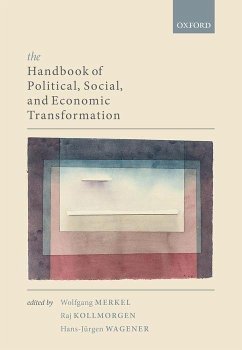The Handbook of Political, Social, and Economic Transformation
Herausgeber: Merkel, Wolfgang; Wagener, Hans-Jurgen; Kollmorgen, Raj
The Handbook of Political, Social, and Economic Transformation
Herausgeber: Merkel, Wolfgang; Wagener, Hans-Jurgen; Kollmorgen, Raj
- Gebundenes Buch
- Merkliste
- Auf die Merkliste
- Bewerten Bewerten
- Teilen
- Produkt teilen
- Produkterinnerung
- Produkterinnerung
This volume, provides an authoritative overview and critique of the role, within the social sciences, of the concept of transformation. It is the definitive point of reference for a range of social and political scientists.
Andere Kunden interessierten sich auch für
![Latin America's Political, Social, and Economic Changes in the Last Half Century Latin America's Political, Social, and Economic Changes in the Last Half Century]() Roberto Miguel RodriguezLatin America's Political, Social, and Economic Changes in the Last Half Century22,99 €
Roberto Miguel RodriguezLatin America's Political, Social, and Economic Changes in the Last Half Century22,99 €![A Letter, Commercial and Political, Addressed to the Rt. Honble. William Pitt A Letter, Commercial and Political, Addressed to the Rt. Honble. William Pitt]() James CurrieA Letter, Commercial and Political, Addressed to the Rt. Honble. William Pitt33,99 €
James CurrieA Letter, Commercial and Political, Addressed to the Rt. Honble. William Pitt33,99 €![The Birth of the new Party; or, Progressive Democracy. A Complete Official Account of the Formation and Organization of the Progressive Party, the Candidates, the Platform, the Principles and the Political, Moral and Industrial Issues Fully Discussed. Wit The Birth of the new Party; or, Progressive Democracy. A Complete Official Account of the Formation and Organization of the Progressive Party, the Candidates, the Platform, the Principles and the Political, Moral and Industrial Issues Fully Discussed. Wit]() George Henry PayneThe Birth of the new Party; or, Progressive Democracy. A Complete Official Account of the Formation and Organization of the Progressive Party, the Candidates, the Platform, the Principles and the Political, Moral and Industrial Issues Fully Discussed. Wit41,99 €
George Henry PayneThe Birth of the new Party; or, Progressive Democracy. A Complete Official Account of the Formation and Organization of the Progressive Party, the Candidates, the Platform, the Principles and the Political, Moral and Industrial Issues Fully Discussed. Wit41,99 €![The consequences of colonial control in Sri Lanka. Political, economic and socio-cultural impacts The consequences of colonial control in Sri Lanka. Political, economic and socio-cultural impacts]() Sakunthala JayamahaThe consequences of colonial control in Sri Lanka. Political, economic and socio-cultural impacts16,95 €
Sakunthala JayamahaThe consequences of colonial control in Sri Lanka. Political, economic and socio-cultural impacts16,95 €![The Historical, Political, and Diplomatic Writings of Niccolo Machiavelli The Historical, Political, and Diplomatic Writings of Niccolo Machiavelli]() Christian Edward DetmoldThe Historical, Political, and Diplomatic Writings of Niccolo Machiavelli44,99 €
Christian Edward DetmoldThe Historical, Political, and Diplomatic Writings of Niccolo Machiavelli44,99 €![Political, Spiritual-Cultural Development of UZBEKISTAN Political, Spiritual-Cultural Development of UZBEKISTAN]() Khulkar KholikulovaPolitical, Spiritual-Cultural Development of UZBEKISTAN49,99 €
Khulkar KholikulovaPolitical, Spiritual-Cultural Development of UZBEKISTAN49,99 €![Political, Social and Religious Studies of the Balkans - Volume II - Radical Islam in the Western Balkans Political, Social and Religious Studies of the Balkans - Volume II - Radical Islam in the Western Balkans]() Raphael Israeli and Ana DimitrovskaPolitical, Social and Religious Studies of the Balkans - Volume II - Radical Islam in the Western Balkans23,99 €
Raphael Israeli and Ana DimitrovskaPolitical, Social and Religious Studies of the Balkans - Volume II - Radical Islam in the Western Balkans23,99 €-
-
-
This volume, provides an authoritative overview and critique of the role, within the social sciences, of the concept of transformation. It is the definitive point of reference for a range of social and political scientists.
Hinweis: Dieser Artikel kann nur an eine deutsche Lieferadresse ausgeliefert werden.
Hinweis: Dieser Artikel kann nur an eine deutsche Lieferadresse ausgeliefert werden.
Produktdetails
- Produktdetails
- Verlag: Oxford University Press
- Seitenzahl: 716
- Erscheinungstermin: 13. April 2019
- Englisch
- Abmessung: 246mm x 175mm x 48mm
- Gewicht: 1429g
- ISBN-13: 9780198829911
- ISBN-10: 0198829914
- Artikelnr.: 53776084
- Herstellerkennzeichnung
- Libri GmbH
- Europaallee 1
- 36244 Bad Hersfeld
- gpsr@libri.de
- Verlag: Oxford University Press
- Seitenzahl: 716
- Erscheinungstermin: 13. April 2019
- Englisch
- Abmessung: 246mm x 175mm x 48mm
- Gewicht: 1429g
- ISBN-13: 9780198829911
- ISBN-10: 0198829914
- Artikelnr.: 53776084
- Herstellerkennzeichnung
- Libri GmbH
- Europaallee 1
- 36244 Bad Hersfeld
- gpsr@libri.de
Wolfgang Merkel, Director of the research unit 'Democracy and Democratization', WZB Berlin Social Science Center and Professor of Political Science at Humboldt-Universitat zu Berlin, , Raj Kollmorgen, Professor of Sociology and Management of Social Change, University of Applied Sciences Zittau/Gorlitz, Hans-Jurgen Wagener, Professor Emeritus, European University Viadrina Frankfurt/Oder and Rijksuniversiteit Groningen
* 1: Wolfgang Merkel, Raj Kollmorgen, and Hans-Jürgen Wagener:
Transformation and Transition Research: An Introduction
* Section I Theoretical Frameworks
* 2: Wolfgang Merkel, Julian Brückner, and Hans-Jürgen Wagener: System
* 3: Stefan Voigt: Institutions
* 4: Wolfgang Merkel and Hans-Jürgen Wagener: Actors
* Section II Research Approaches
* 5: Raj Kollmorgen: Modernization Theories
* 6: Julian Brückner: Transition Approaches
* 7: Julian Brückner: Structuralism
* 8: Jan Kubik: Cultural Approaches
* 9: Christoph H. Stefes: Historical Institutionalism and Societal
Transformations
* 10: Malcolm H. Dunn and Joseph P. Ganahl: Development Economics and
Transformation Studies
* 11: Stefan Kolev and Joachim Zweynert: Approaches to Transformation
in Economics
* 12: Frank Bönker: Political Economy Approaches
* 13: Jürgen Beyer: Political Steering Approach
* 14: Karl-Dieter Opp: Political Mobilization Approaches
* 15: Grzegorz Ekiert: Civil Society Approach
* 16: Raj Kollmorgen and Wolfgang Merkel: Combining Theoretical
Approaches
* Section III Methods
* 17: Carsten Q. Schneider: Macro-Qualitative Approaches
* 18: Bruno Hildenbrand: Micro-Qualitative Research
* 19: Gert Pickel and Susanne Pickel: Quantitative Methods in
Transformation Research
* 20: Tatjana Thelen: Ethnographic Methods
* 21: Johannes Angermuller and Raj Kollmorgen: Discourse Approaches
* 22: Martin Myant and Jan Drahokoupil: Economic Methods
* 23: Dirk Berg-Schlosser: Comparative Methods in Transformation
Research: Political Culture
* Section IV Historic Waves and Types of Societal Transformations
* 24: Raj Kollmorgen: Post-Absolutist Transformations in the Nineteenth
and Early Twentieth Centuries
* 25: Dieter Segert: State-Socialist Transformations in the Twentieth
Century
* 26: Alexander Nützenadel: Transformation in Fascist Interbellum
Europe
* 27: Wolfgang Merkel and Johannes Gerschewski: Democratic
Transformations after the Second World War
* 28: Carsten Herrmann-Pillath: China's Transformations in the
Twentieth Century: Economic, Political and Cultural Interdependencies
* 29: Siegmar Schmidt: Postcolonial Transformations in Africa in the
Twentieth Century
* 30: Naser Ghobadzadeh: Islamist Transformations: From Utopian Vision
to Dystopian Reality
* 31: Peter Thiery: Democratic Transitions in the Late Twentieth
Century
* 32: Raj Kollmorgen: Post-socialist Transformations in the Twentieth
and Twenty-First Centuries
* Section V Spheres
* 33: John Keane and Wolfgang Merkel: Civil Society
* 34: Christian Kirchner and David Ehmke: Law
* 35: Hans-Jürgen Wagener: Economy
* Section VI Basic Problems of Transformation
* 36: Antje Kästner: Autocracy Promotion
* 37: Anton Sterbling: Collective Identities
* 38: Astrid Lorenz: Constitution-building
* 39: Bernhard Weßels: Corporative Actors: Parties, Associations
* 40: Attila Ágh: Deconsolidation of Democracy in East-Central Europe
* 41: Aurel Croissant and Wolfgang Merkel: Defective Democracy
* 42: Julia Leininger: Democracy Promotion
* 43: Leonardo Morlino: Democratic Consolidation
* 44: Jürgen Dorbritz: Demographic Transitions
* 45: Ilyas Saliba and Wolfgang Merkel: Dilemma of Simultaneity
* 46: Michael Fritsch: Economic Restructuring
* 47: Andreas Schedler: Elections and Transformation
* 48: Cristóbal Rovira Kaltwasser: Elites
* 49: Vera Trappmann: External Transformation Anchors
* 50: Hans-Dieter Klingemann: Founding Elections
* 51: Silke Roth and Charlie Walker: Gender Relations
* 52: Aurel Croissant: Historical Legacies
* 53: Alexander Schmotz: Hybrid Regimes
* 54: Hans-Jürgen Wagener: Institutional Transfer
* 55: Herman W. Hoen: Internationalization
* 56: Katharina Pistor: Legal Systems and Economic Development
* 57: Daniel Lambach: Legitimacy
* 58: László Csaba: Liberalization
* 59: Marek Dabrowski: Macroeconomic Stabilization
* 60: Barbara Thomaß: Mass Media
* 61: Sonja Grimm: Military Intervention
* 62: Hubert Gabrisch: Monetary Transformation
* 63: Saara Inkinen: Parties as Agents of Transition
* 64: Wolfgang Merkel and Lea Heyne: Phases of Transformation
* 65: Detlef Pollack: Political Culture
* 66: Dag Tanneberg: Political Repression
* 67: Bruno Dallago and Chiara Guglielmetti: Privatization
* 68: Thomas Apolte: Property Rights
* 69: Hans-Joachim Lauth: Regime Diffusion
* 70: Hans-Joachim Bürkner: Regional Disparities
* 71: Detlef Pollack: Religious Change
* 72: Anne van Aaken: Rule of Law and Statehood
* 73: Kenneth Newton: Social Capital
* 74: Raj Kollmorgen: Social Inequalities
* 75: Katharina Müller: Social Security
* 76: Timm Beichelt: Stateness
* 77: Vladimir Popov: Strategies of Economic Transformation
* 78: Jan Fidrmuc: Transformation Crises
* 79: Brigitte Weiffen: Transitional Justice
* 80: Bernhard Weßels: Value Change
Transformation and Transition Research: An Introduction
* Section I Theoretical Frameworks
* 2: Wolfgang Merkel, Julian Brückner, and Hans-Jürgen Wagener: System
* 3: Stefan Voigt: Institutions
* 4: Wolfgang Merkel and Hans-Jürgen Wagener: Actors
* Section II Research Approaches
* 5: Raj Kollmorgen: Modernization Theories
* 6: Julian Brückner: Transition Approaches
* 7: Julian Brückner: Structuralism
* 8: Jan Kubik: Cultural Approaches
* 9: Christoph H. Stefes: Historical Institutionalism and Societal
Transformations
* 10: Malcolm H. Dunn and Joseph P. Ganahl: Development Economics and
Transformation Studies
* 11: Stefan Kolev and Joachim Zweynert: Approaches to Transformation
in Economics
* 12: Frank Bönker: Political Economy Approaches
* 13: Jürgen Beyer: Political Steering Approach
* 14: Karl-Dieter Opp: Political Mobilization Approaches
* 15: Grzegorz Ekiert: Civil Society Approach
* 16: Raj Kollmorgen and Wolfgang Merkel: Combining Theoretical
Approaches
* Section III Methods
* 17: Carsten Q. Schneider: Macro-Qualitative Approaches
* 18: Bruno Hildenbrand: Micro-Qualitative Research
* 19: Gert Pickel and Susanne Pickel: Quantitative Methods in
Transformation Research
* 20: Tatjana Thelen: Ethnographic Methods
* 21: Johannes Angermuller and Raj Kollmorgen: Discourse Approaches
* 22: Martin Myant and Jan Drahokoupil: Economic Methods
* 23: Dirk Berg-Schlosser: Comparative Methods in Transformation
Research: Political Culture
* Section IV Historic Waves and Types of Societal Transformations
* 24: Raj Kollmorgen: Post-Absolutist Transformations in the Nineteenth
and Early Twentieth Centuries
* 25: Dieter Segert: State-Socialist Transformations in the Twentieth
Century
* 26: Alexander Nützenadel: Transformation in Fascist Interbellum
Europe
* 27: Wolfgang Merkel and Johannes Gerschewski: Democratic
Transformations after the Second World War
* 28: Carsten Herrmann-Pillath: China's Transformations in the
Twentieth Century: Economic, Political and Cultural Interdependencies
* 29: Siegmar Schmidt: Postcolonial Transformations in Africa in the
Twentieth Century
* 30: Naser Ghobadzadeh: Islamist Transformations: From Utopian Vision
to Dystopian Reality
* 31: Peter Thiery: Democratic Transitions in the Late Twentieth
Century
* 32: Raj Kollmorgen: Post-socialist Transformations in the Twentieth
and Twenty-First Centuries
* Section V Spheres
* 33: John Keane and Wolfgang Merkel: Civil Society
* 34: Christian Kirchner and David Ehmke: Law
* 35: Hans-Jürgen Wagener: Economy
* Section VI Basic Problems of Transformation
* 36: Antje Kästner: Autocracy Promotion
* 37: Anton Sterbling: Collective Identities
* 38: Astrid Lorenz: Constitution-building
* 39: Bernhard Weßels: Corporative Actors: Parties, Associations
* 40: Attila Ágh: Deconsolidation of Democracy in East-Central Europe
* 41: Aurel Croissant and Wolfgang Merkel: Defective Democracy
* 42: Julia Leininger: Democracy Promotion
* 43: Leonardo Morlino: Democratic Consolidation
* 44: Jürgen Dorbritz: Demographic Transitions
* 45: Ilyas Saliba and Wolfgang Merkel: Dilemma of Simultaneity
* 46: Michael Fritsch: Economic Restructuring
* 47: Andreas Schedler: Elections and Transformation
* 48: Cristóbal Rovira Kaltwasser: Elites
* 49: Vera Trappmann: External Transformation Anchors
* 50: Hans-Dieter Klingemann: Founding Elections
* 51: Silke Roth and Charlie Walker: Gender Relations
* 52: Aurel Croissant: Historical Legacies
* 53: Alexander Schmotz: Hybrid Regimes
* 54: Hans-Jürgen Wagener: Institutional Transfer
* 55: Herman W. Hoen: Internationalization
* 56: Katharina Pistor: Legal Systems and Economic Development
* 57: Daniel Lambach: Legitimacy
* 58: László Csaba: Liberalization
* 59: Marek Dabrowski: Macroeconomic Stabilization
* 60: Barbara Thomaß: Mass Media
* 61: Sonja Grimm: Military Intervention
* 62: Hubert Gabrisch: Monetary Transformation
* 63: Saara Inkinen: Parties as Agents of Transition
* 64: Wolfgang Merkel and Lea Heyne: Phases of Transformation
* 65: Detlef Pollack: Political Culture
* 66: Dag Tanneberg: Political Repression
* 67: Bruno Dallago and Chiara Guglielmetti: Privatization
* 68: Thomas Apolte: Property Rights
* 69: Hans-Joachim Lauth: Regime Diffusion
* 70: Hans-Joachim Bürkner: Regional Disparities
* 71: Detlef Pollack: Religious Change
* 72: Anne van Aaken: Rule of Law and Statehood
* 73: Kenneth Newton: Social Capital
* 74: Raj Kollmorgen: Social Inequalities
* 75: Katharina Müller: Social Security
* 76: Timm Beichelt: Stateness
* 77: Vladimir Popov: Strategies of Economic Transformation
* 78: Jan Fidrmuc: Transformation Crises
* 79: Brigitte Weiffen: Transitional Justice
* 80: Bernhard Weßels: Value Change
* 1: Wolfgang Merkel, Raj Kollmorgen, and Hans-Jürgen Wagener:
Transformation and Transition Research: An Introduction
* Section I Theoretical Frameworks
* 2: Wolfgang Merkel, Julian Brückner, and Hans-Jürgen Wagener: System
* 3: Stefan Voigt: Institutions
* 4: Wolfgang Merkel and Hans-Jürgen Wagener: Actors
* Section II Research Approaches
* 5: Raj Kollmorgen: Modernization Theories
* 6: Julian Brückner: Transition Approaches
* 7: Julian Brückner: Structuralism
* 8: Jan Kubik: Cultural Approaches
* 9: Christoph H. Stefes: Historical Institutionalism and Societal
Transformations
* 10: Malcolm H. Dunn and Joseph P. Ganahl: Development Economics and
Transformation Studies
* 11: Stefan Kolev and Joachim Zweynert: Approaches to Transformation
in Economics
* 12: Frank Bönker: Political Economy Approaches
* 13: Jürgen Beyer: Political Steering Approach
* 14: Karl-Dieter Opp: Political Mobilization Approaches
* 15: Grzegorz Ekiert: Civil Society Approach
* 16: Raj Kollmorgen and Wolfgang Merkel: Combining Theoretical
Approaches
* Section III Methods
* 17: Carsten Q. Schneider: Macro-Qualitative Approaches
* 18: Bruno Hildenbrand: Micro-Qualitative Research
* 19: Gert Pickel and Susanne Pickel: Quantitative Methods in
Transformation Research
* 20: Tatjana Thelen: Ethnographic Methods
* 21: Johannes Angermuller and Raj Kollmorgen: Discourse Approaches
* 22: Martin Myant and Jan Drahokoupil: Economic Methods
* 23: Dirk Berg-Schlosser: Comparative Methods in Transformation
Research: Political Culture
* Section IV Historic Waves and Types of Societal Transformations
* 24: Raj Kollmorgen: Post-Absolutist Transformations in the Nineteenth
and Early Twentieth Centuries
* 25: Dieter Segert: State-Socialist Transformations in the Twentieth
Century
* 26: Alexander Nützenadel: Transformation in Fascist Interbellum
Europe
* 27: Wolfgang Merkel and Johannes Gerschewski: Democratic
Transformations after the Second World War
* 28: Carsten Herrmann-Pillath: China's Transformations in the
Twentieth Century: Economic, Political and Cultural Interdependencies
* 29: Siegmar Schmidt: Postcolonial Transformations in Africa in the
Twentieth Century
* 30: Naser Ghobadzadeh: Islamist Transformations: From Utopian Vision
to Dystopian Reality
* 31: Peter Thiery: Democratic Transitions in the Late Twentieth
Century
* 32: Raj Kollmorgen: Post-socialist Transformations in the Twentieth
and Twenty-First Centuries
* Section V Spheres
* 33: John Keane and Wolfgang Merkel: Civil Society
* 34: Christian Kirchner and David Ehmke: Law
* 35: Hans-Jürgen Wagener: Economy
* Section VI Basic Problems of Transformation
* 36: Antje Kästner: Autocracy Promotion
* 37: Anton Sterbling: Collective Identities
* 38: Astrid Lorenz: Constitution-building
* 39: Bernhard Weßels: Corporative Actors: Parties, Associations
* 40: Attila Ágh: Deconsolidation of Democracy in East-Central Europe
* 41: Aurel Croissant and Wolfgang Merkel: Defective Democracy
* 42: Julia Leininger: Democracy Promotion
* 43: Leonardo Morlino: Democratic Consolidation
* 44: Jürgen Dorbritz: Demographic Transitions
* 45: Ilyas Saliba and Wolfgang Merkel: Dilemma of Simultaneity
* 46: Michael Fritsch: Economic Restructuring
* 47: Andreas Schedler: Elections and Transformation
* 48: Cristóbal Rovira Kaltwasser: Elites
* 49: Vera Trappmann: External Transformation Anchors
* 50: Hans-Dieter Klingemann: Founding Elections
* 51: Silke Roth and Charlie Walker: Gender Relations
* 52: Aurel Croissant: Historical Legacies
* 53: Alexander Schmotz: Hybrid Regimes
* 54: Hans-Jürgen Wagener: Institutional Transfer
* 55: Herman W. Hoen: Internationalization
* 56: Katharina Pistor: Legal Systems and Economic Development
* 57: Daniel Lambach: Legitimacy
* 58: László Csaba: Liberalization
* 59: Marek Dabrowski: Macroeconomic Stabilization
* 60: Barbara Thomaß: Mass Media
* 61: Sonja Grimm: Military Intervention
* 62: Hubert Gabrisch: Monetary Transformation
* 63: Saara Inkinen: Parties as Agents of Transition
* 64: Wolfgang Merkel and Lea Heyne: Phases of Transformation
* 65: Detlef Pollack: Political Culture
* 66: Dag Tanneberg: Political Repression
* 67: Bruno Dallago and Chiara Guglielmetti: Privatization
* 68: Thomas Apolte: Property Rights
* 69: Hans-Joachim Lauth: Regime Diffusion
* 70: Hans-Joachim Bürkner: Regional Disparities
* 71: Detlef Pollack: Religious Change
* 72: Anne van Aaken: Rule of Law and Statehood
* 73: Kenneth Newton: Social Capital
* 74: Raj Kollmorgen: Social Inequalities
* 75: Katharina Müller: Social Security
* 76: Timm Beichelt: Stateness
* 77: Vladimir Popov: Strategies of Economic Transformation
* 78: Jan Fidrmuc: Transformation Crises
* 79: Brigitte Weiffen: Transitional Justice
* 80: Bernhard Weßels: Value Change
Transformation and Transition Research: An Introduction
* Section I Theoretical Frameworks
* 2: Wolfgang Merkel, Julian Brückner, and Hans-Jürgen Wagener: System
* 3: Stefan Voigt: Institutions
* 4: Wolfgang Merkel and Hans-Jürgen Wagener: Actors
* Section II Research Approaches
* 5: Raj Kollmorgen: Modernization Theories
* 6: Julian Brückner: Transition Approaches
* 7: Julian Brückner: Structuralism
* 8: Jan Kubik: Cultural Approaches
* 9: Christoph H. Stefes: Historical Institutionalism and Societal
Transformations
* 10: Malcolm H. Dunn and Joseph P. Ganahl: Development Economics and
Transformation Studies
* 11: Stefan Kolev and Joachim Zweynert: Approaches to Transformation
in Economics
* 12: Frank Bönker: Political Economy Approaches
* 13: Jürgen Beyer: Political Steering Approach
* 14: Karl-Dieter Opp: Political Mobilization Approaches
* 15: Grzegorz Ekiert: Civil Society Approach
* 16: Raj Kollmorgen and Wolfgang Merkel: Combining Theoretical
Approaches
* Section III Methods
* 17: Carsten Q. Schneider: Macro-Qualitative Approaches
* 18: Bruno Hildenbrand: Micro-Qualitative Research
* 19: Gert Pickel and Susanne Pickel: Quantitative Methods in
Transformation Research
* 20: Tatjana Thelen: Ethnographic Methods
* 21: Johannes Angermuller and Raj Kollmorgen: Discourse Approaches
* 22: Martin Myant and Jan Drahokoupil: Economic Methods
* 23: Dirk Berg-Schlosser: Comparative Methods in Transformation
Research: Political Culture
* Section IV Historic Waves and Types of Societal Transformations
* 24: Raj Kollmorgen: Post-Absolutist Transformations in the Nineteenth
and Early Twentieth Centuries
* 25: Dieter Segert: State-Socialist Transformations in the Twentieth
Century
* 26: Alexander Nützenadel: Transformation in Fascist Interbellum
Europe
* 27: Wolfgang Merkel and Johannes Gerschewski: Democratic
Transformations after the Second World War
* 28: Carsten Herrmann-Pillath: China's Transformations in the
Twentieth Century: Economic, Political and Cultural Interdependencies
* 29: Siegmar Schmidt: Postcolonial Transformations in Africa in the
Twentieth Century
* 30: Naser Ghobadzadeh: Islamist Transformations: From Utopian Vision
to Dystopian Reality
* 31: Peter Thiery: Democratic Transitions in the Late Twentieth
Century
* 32: Raj Kollmorgen: Post-socialist Transformations in the Twentieth
and Twenty-First Centuries
* Section V Spheres
* 33: John Keane and Wolfgang Merkel: Civil Society
* 34: Christian Kirchner and David Ehmke: Law
* 35: Hans-Jürgen Wagener: Economy
* Section VI Basic Problems of Transformation
* 36: Antje Kästner: Autocracy Promotion
* 37: Anton Sterbling: Collective Identities
* 38: Astrid Lorenz: Constitution-building
* 39: Bernhard Weßels: Corporative Actors: Parties, Associations
* 40: Attila Ágh: Deconsolidation of Democracy in East-Central Europe
* 41: Aurel Croissant and Wolfgang Merkel: Defective Democracy
* 42: Julia Leininger: Democracy Promotion
* 43: Leonardo Morlino: Democratic Consolidation
* 44: Jürgen Dorbritz: Demographic Transitions
* 45: Ilyas Saliba and Wolfgang Merkel: Dilemma of Simultaneity
* 46: Michael Fritsch: Economic Restructuring
* 47: Andreas Schedler: Elections and Transformation
* 48: Cristóbal Rovira Kaltwasser: Elites
* 49: Vera Trappmann: External Transformation Anchors
* 50: Hans-Dieter Klingemann: Founding Elections
* 51: Silke Roth and Charlie Walker: Gender Relations
* 52: Aurel Croissant: Historical Legacies
* 53: Alexander Schmotz: Hybrid Regimes
* 54: Hans-Jürgen Wagener: Institutional Transfer
* 55: Herman W. Hoen: Internationalization
* 56: Katharina Pistor: Legal Systems and Economic Development
* 57: Daniel Lambach: Legitimacy
* 58: László Csaba: Liberalization
* 59: Marek Dabrowski: Macroeconomic Stabilization
* 60: Barbara Thomaß: Mass Media
* 61: Sonja Grimm: Military Intervention
* 62: Hubert Gabrisch: Monetary Transformation
* 63: Saara Inkinen: Parties as Agents of Transition
* 64: Wolfgang Merkel and Lea Heyne: Phases of Transformation
* 65: Detlef Pollack: Political Culture
* 66: Dag Tanneberg: Political Repression
* 67: Bruno Dallago and Chiara Guglielmetti: Privatization
* 68: Thomas Apolte: Property Rights
* 69: Hans-Joachim Lauth: Regime Diffusion
* 70: Hans-Joachim Bürkner: Regional Disparities
* 71: Detlef Pollack: Religious Change
* 72: Anne van Aaken: Rule of Law and Statehood
* 73: Kenneth Newton: Social Capital
* 74: Raj Kollmorgen: Social Inequalities
* 75: Katharina Müller: Social Security
* 76: Timm Beichelt: Stateness
* 77: Vladimir Popov: Strategies of Economic Transformation
* 78: Jan Fidrmuc: Transformation Crises
* 79: Brigitte Weiffen: Transitional Justice
* 80: Bernhard Weßels: Value Change








